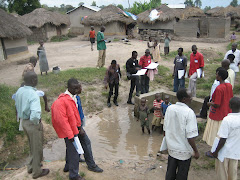Christmas 2016 WASH update
This year was year of successes and disappointments in my
WASH (safe WAter, Sanitation, & Hygiene) efforts. In India, out WASH promotion campaign was very successful, but our indigenous promoters proved unwilling to deal with sanitation. In
Uganda, the LadderLoo worked as advertised (no flies, no odor, not gross) and
the users provided very positive feedback like “I will install my own LadderLoo
when I return to my home.” A cholera
epidemic was raging while I was here. Over
500 died in the vicinity in just the first 6 weeks of 2016. We could have solved that with the LadderLoo, but our indigenous partner was not truly committed to testing or teaching holistic WASH. Now we are negotiating
with some potential new partners for 2017.
 |
| Digging a pit for the first LadderLoo in India |
I learned a key lesson that I had NEVER heard mentioned in
all my WASH training: Poor farmers who
are receptive to safe sanitation are often renters who are at the mercy of
their landlords who may not allow their renters to install a latrine. Often the landlords selfishly want to repress
their renters or to prevent Christian NGO’s from having influence.
An even more important lesson continues to be overlooked by
most NGO’s involved with sanitation: MOST LATRINES LABELED TO BE "COMPOSTING” PUT THEIR USERS AT RISK OF PATHOGENIC WORM INFECTION. Composting is aerobic (oxygenated) and
achieves temperatures of 130 to 160 F which kill even resistant helminth
eggs.
·
Pathogenic worms (helminths) and their eggs can
survive for years in burial conditions.
·
This has important consequences. WHO estimates
about 2 billion people are infected by helminths.
·
Instructions for some latrines like the Fossa
Alterna and the ArborLoo state that “composted” sewage that has resided in a
pit for a year is safe to dig up for use as fertilizer. This is not true much of the time, because a
pit is a low temperature anaerobic (no oxygen) environment. Therefore handling
“compost” can expose people to parasitic worms. The only way latrine contents are composted is
by getting air to them – often by turning the contents with a pitchfork.
